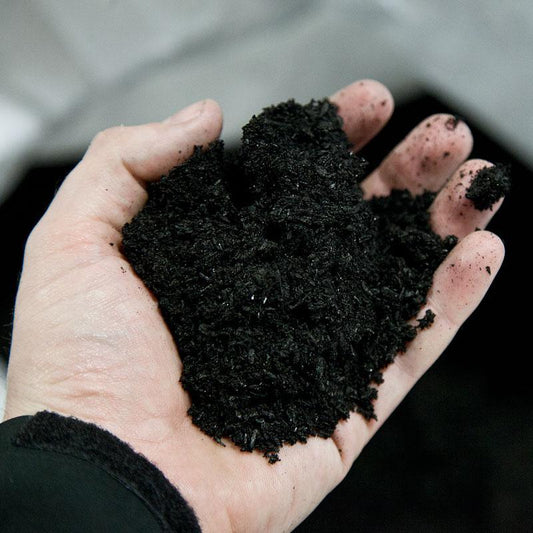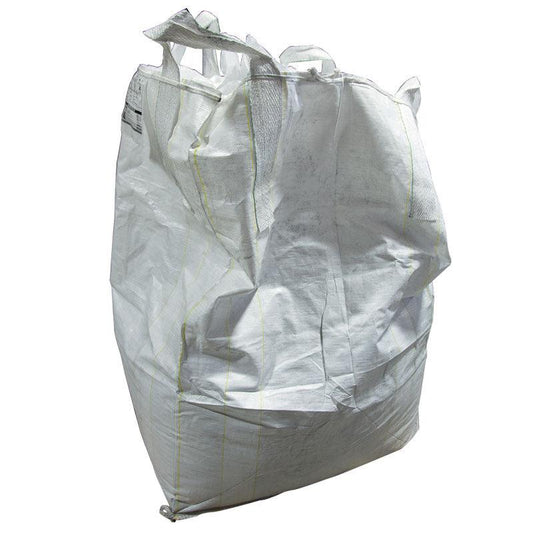Have You Heard of Biochar?
This “new” organic soil amendment, known as biochar fertilizer, is a safe and effective way to improve soil health, offering numerous benefits from increasing water retention and supporting beneficial soil microbes to reducing carbon dioxide emissions. But what is biochar, and how does it work?
Biochar fertilizer is a unique form of charcoal produced through pyrolysis—a process that involves heating organic materials, such as untreated wood waste, at over 1000°C in an oxygen-free environment. Unlike traditional mined charcoal, biochar’s highly porous structure allows it to retain nutrients and moisture while providing habitat for essential microorganisms. This process also plays a significant role in sequestering carbon dioxide, helping to mitigate climate change by locking carbon into the soil for centuries. The use of biochar enhances soil conditions and promotes improved fertility.
Historically, indigenous people created fertile soils called terra preta or “dark earth,” which are rich in biochar and remain highly productive even after thousands of years. Today, biochar fertilizer is gaining global recognition as a sustainable practice for gardening and farming, offering exciting opportunities to improve agricultural methods while contributing positively to the planet’s health.

History of Biochar
Although biochar might seem like a new innovation, the concept has been used for over 7,000 years in the Amazon Basin of South America, where it is known as Terra Preta or “black soil.” These ancient soils, rich in biochar, remain highly fertile today. Modern technology has made biochar production more efficient, using cleaner-burning methods that minimize environmental impact. This has led to growing interest in biochar as a solution for reducing greenhouse gas emissions.
Many waste disposal methods, including composting, incineration, and slash-and-burn, contribute to carbon emissions. In contrast, biochar production is considered one of the most environmentally friendly options, as it sequesters atmospheric carbon in the soil for thousands of years.
Environmental Considerations
Among the various methods for organic waste disposal, biochar is unique because it does not release greenhouse gases into the atmosphere. Instead, it locks carbon into the soil, making it an important tool in regenerative agriculture and climate change mitigation.
High-quality biochar is produced at high temperatures to ensure it is free from contaminants such as PAHs (Polycyclic Aromatic Hydrocarbons) or PCBs (Polychlorinated Biphenyls). Unlike many fertilizers, even organic certification does not always require testing for these compounds, making biochar a trusted option for improving soil health.
What Does Biochar Do in the Soil?
Biochar itself does not add nutrients to the soil, but its benefits come from its highly porous structure, which enhances soil fertility in several ways:
- Improves soil structure by creating pockets for air and water infiltration
- Increases water retention, making it ideal for dry regions or sandy soils
- Enhances cation exchange capacity (CEC), preventing nutrient leaching
- Binds to essential soil nutrients like calcium, potassium, and magnesium, reducing soil acidity
- Reduces fertilizer runoff, making it safer for groundwater and surface water
Biochar Benefits Soil Biology
The porous surface of biochar provides an ideal habitat for beneficial microbes and mycorrhizal fungi, which are essential for healthy soil biology. Over time, microbes naturally colonize the biochar, but you can accelerate this process by “pre-charging” or “activating” it before application.
If biochar is added to the soil without activation, it may temporarily bind nutrients, making them less available to plants. However, this is only a short-term effect, and over time, biochar contributes to a net increase in soil nutrients.
Charging Your Biochar Before Planting
For best results, mix biochar into the soil at a depth of at least six inches, with a recommended application of up to a one-inch layer. Since biochar remains in the soil for centuries, it only needs to be applied once.
To activate biochar, consider these methods:
- Compost Integration: Mix biochar into your compost pile as it decomposes. This enhances microbial activity, shortens composting time, reduces odors, and minimizes gaseous emissions.
- Farm Animal Bedding: Spread biochar in fresh animal bedding before composting. By the time the bedding breaks down, the biochar will be fully charged with nutrients and beneficial microbes.
- Compost Tea Activation: Stir biochar into water before adding compost tea ingredients. Let it brew as usual to infuse the biochar with microbial life.
Shortcut to Activating Biochar
If you need a faster activation method, try these approaches:
- A week or two before application, mix biochar with finished compost, organic fertilizer, worm castings, humates, and/or mycorrhizal fungi.
- Incorporate biochar directly into the soil alongside compost or fertilizer and irrigate well.
- Pre-wet biochar before adding it to the soil to encourage microbes to move in faster.
Even if you skip activation, biochar will still improve water retention, nutrient availability, microbial diversity, and overall soil structure. However, activating it first will speed up these benefits.
Experience the Benefits of Biochar
By incorporating biochar fertilizer into your garden, you can significantly improve soil health while supporting sustainable agricultural practices. If you've ever wondered what is biochar, it's one of the most effective forms of charcoal, produced through a high-temperature, low-oxygen process called pyrolysis. This method not only creates a highly porous material that enhances soil biology but also sequesters carbon dioxide, making it an important tool in the fight against climate change.
Inspired by the ancient fertile soils called terra preta of the Amazon—soils enriched with biochar that remain productive for thousands of years—modern gardeners and farmers are rediscovering its value. Whether you're aiming to increase water retention, support beneficial microbes, or build a long-term carbon sink, biochar fertilizer offers a natural and effective solution.
Looking to get started? Explore our selection of high-quality biochar for sale and discover how it can transform your soil and garden.
Try adding biochar to your soil and grow organic... for Life!
For more information on organic gardening, visit our Resource Center and explore our selection of biochar for sale.





1 comment
how to increase the size of onion from 1.5" to 2.5" through biochar. Because I want to enrich my soil.